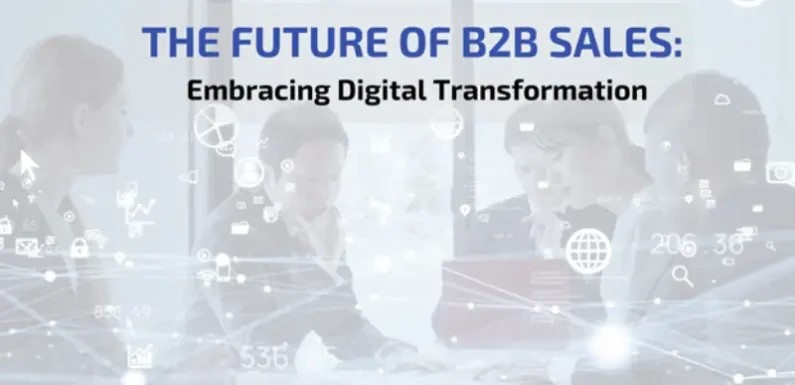
In today’s digital age, B2B sales must evolve to keep pace with changing market demands. Adopting digital transformation promotes stronger client relationships and increased operational efficiency. This blog examines the significant developments in digital evolution and explains why it is essential for B2B growth.
What Makes Digital Evolution Crucial for B2B Sales?
Here are key reasons why brands are embracing digital transformation to grow and achieve organizational goals:
- Stand Out from Competitors: It helps companies offer unique solutions, making them more appealing to customers.
- Boost Productivity: Digital technology helps businesses operate more quickly and effectively by simplifying processes.
- Enhance Customer Engagement: Companies can leverage digital platforms to build more profound connections with their clients.
- Boost Decision-Making: Businesses can strengthen their strategy and react effectively to changes with the help of data-driven insights.
- Encourage Innovation: A culture where fresh concepts are welcomed and appreciated is produced by embracing digital transformation.
- Adapt Business Models: Digital transformation enables businesses to get creative with new business models and maintain their flexibility in dynamic marketplaces.
Leading Trends in Digital Transformation of B2B Sales
1. Data-Driven Decision Making
With access to advanced analytics, B2B sales teams can take data-driven decisions rather than relying primarily on gut instincts. Data insights are used now for a variety of purposes, including analyzing client preferences and anticipating behavior.
Sales teams can better prioritize leads and personalize their approach by enhancing targeting, increasing conversion rates, and developing stronger customer connections.
2. Automation and Artificial Intelligence (AI)
Numerous B2B sales processes, such as lead scoring and follow-up email sending, are becoming more efficient thanks to automation and AI. These monotonous procedures can be automated to free up sales employees to concentrate on high-value connections.
With its ability to recognize patterns and anticipate demands that are hard to detect manually, AI is additionally transforming consumer insights. This helps companies proactively engage customers, personalize experiences, and accurately forecast future sales.
3. Integration with E-Commerce Platforms
Integrating sales methods with e-commerce platforms is crucial as more B2B buyers choose to complete their purchases online. This arrangement accommodates the digital needs of today’s business-to-business clients by facilitating a smooth purchasing process from research to order placement.
Businesses can additionally utilize e-commerce SEO services to improve product pages for search engines, which will help buyers identify items, understand details, and make well-informed purchases without ever leaving the platform.
4. Omnichannel Engagement
B2B buyers today expect to engage with businesses across multiple channels—email, social media, websites, and even messaging platforms. An omnichannel approach ensures customers receive a consistent experience, regardless of how or where they engage.
It allows sales teams to be present on the channels customers prefer, creating a cohesive journey where each touchpoint builds on the last. In an omnichannel approach, timely, personalized messages strengthen relationships and maintain lead engagement.
5. Global Reach
Digital transformation eliminates geographic boundaries, making it simple for businesses to connect with clients abroad. B2B businesses can frequently connect with international markets through digital methods without being physically present everywhere.
To effectively target a global audience, businesses can modify their content to satisfy the linguistic and cultural demands of various regional audiences, guaranteeing a truly localized experience.
6. Customer-Centric Approach
B2B sales now revolve around a customer-centric approach, with businesses using digital technologies to provide incredibly customized experiences. Sales teams can better understand the wants, preferences, and difficulties of each client with the use of data.
This strategy is further strengthened by collecting and acting upon consumer feedback, which enables businesses to make changes based on their clients’ opinions. This emphasis on providing genuine value develops confidence and establishes enduring commercial partnerships.
7. Mobile Optimization and Digital Accessibility
Mobile devices are a common source of information for B2B decision-makers, mainly while they are on the move. Mobile-friendly websites and digital tools provide a smooth experience, from examining product specifications to submitting requests.
Accessibility is equally important, as companies that prioritize digital accessibility ensure all users, including those with disabilities, can easily engage. This shows a dedication to diversity in addition to broadening reach.
8. Use of Digital Marketing Services for Sales Enablement
There is a growing convergence between digital marketing and sales enablement. For example, due to content marketing, prospective customers can make educated selections even before they speak with a salesperson.
Additionally, social interaction increases by opting for digital marketing services, particularly on networks like LinkedIn, where businesses can establish direct connections with industry players. In fact, a study reveals that 84% of B2B marketers believe LinkedIn provides the greatest value as a social media platform. Additionally, targeted email marketing initiatives continue to be quite successful in advancing leads along the sales funnel by providing them with customized information.
9. Cloud-Based CRM and Sales Tools
Cloud-based Customer Relationship Management (CRM) systems offer a centralized hub for customer data, accessible to sales teams anytime, anywhere. The availability of real-time data facilitates collaboration by allowing team members to coordinate actions and respond quickly to customer needs.
Additionally, cloud CRMs offer strong security, protecting private client data and facilitating remote work—a crucial benefit as teams grow geographically separated.
Startups Handling Digital Evolution
Startups are using new strategies and technology to stay competitive in a market that is evolving rapidly as they navigate the digital transition.
- Embracing Technology: To improve operations and boost efficiency, startups are using cloud-based technologies, automation, and artificial intelligence.
- Emphasizing E-Commerce: To satisfy the rising demand for online shopping, several entrepreneurs are developing robust e-commerce platforms.
- Optimizing for Search Engines: Startups are utilizing e-commerce SEO services to raise their search engine ranks, draw in more customers, and boost exposure.
- Encouraging Customer-Centricity: Startups value interacting with customers and use digital technologies to create enduring bonds and brand loyalty.
Conclusion
In a nutshell, Digital evolution is no longer optional for B2B sales, it’s a necessity. Businesses can enhance client engagement, streamline operations, and maintain an advantage over competitors by implementing new tactics and technology. Accepting these changes guarantees long-term success and growth in a market that is becoming increasingly digitally driven.
Ready to innovate? Contact us and discuss how digital transformation can empower your B2B business.
Author Bio –

Khushpreet Kaur is a writer with a strong background in working for a woosper, digital marketing company, where she specializes in crafting content that drives business growth. With a passion for exploring new places and reading books she brings fresh perspectives to her writing. Her curiosity fuels her creativity, making every project an exciting journey.
